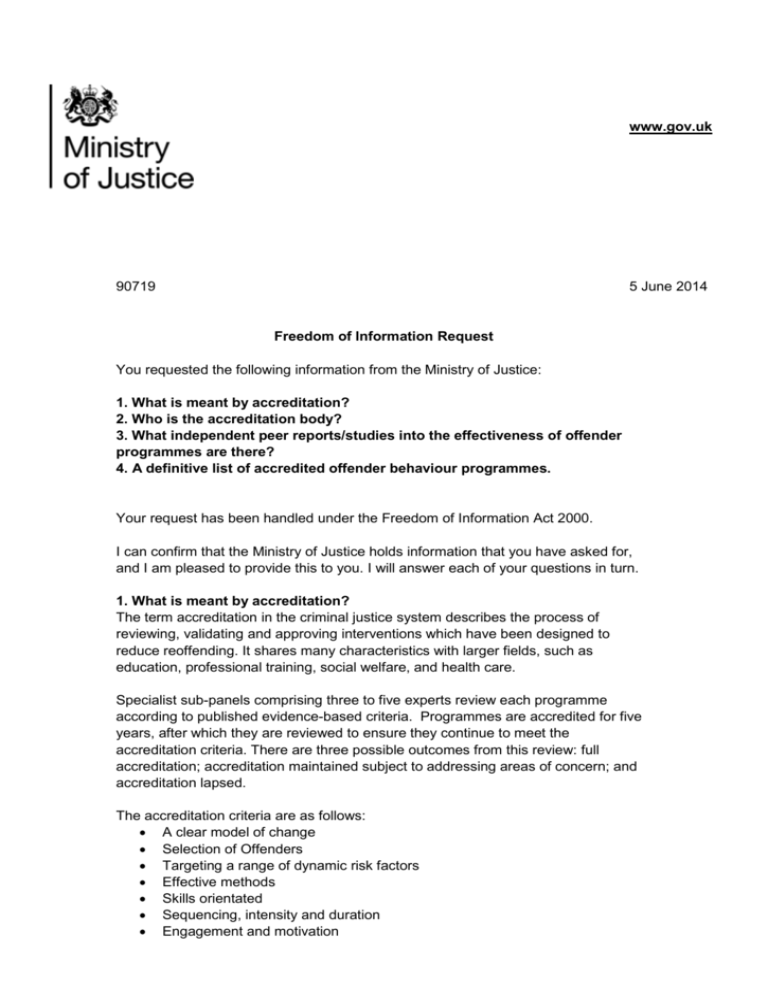What is meant by the accreditation and who is the
advertisement

www.gov.uk 90719 5 June 2014 Freedom of Information Request You requested the following information from the Ministry of Justice: 1. What is meant by accreditation? 2. Who is the accreditation body? 3. What independent peer reports/studies into the effectiveness of offender programmes are there? 4. A definitive list of accredited offender behaviour programmes. Your request has been handled under the Freedom of Information Act 2000. I can confirm that the Ministry of Justice holds information that you have asked for, and I am pleased to provide this to you. I will answer each of your questions in turn. 1. What is meant by accreditation? The term accreditation in the criminal justice system describes the process of reviewing, validating and approving interventions which have been designed to reduce reoffending. It shares many characteristics with larger fields, such as education, professional training, social welfare, and health care. Specialist sub-panels comprising three to five experts review each programme according to published evidence-based criteria. Programmes are accredited for five years, after which they are reviewed to ensure they continue to meet the accreditation criteria. There are three possible outcomes from this review: full accreditation; accreditation maintained subject to addressing areas of concern; and accreditation lapsed. The accreditation criteria are as follows: A clear model of change Selection of Offenders Targeting a range of dynamic risk factors Effective methods Skills orientated Sequencing, intensity and duration Engagement and motivation Continuity of Programmes and Services Process Evaluation and Maintaining Integrity Ongoing Evaluation. 2. Who is the accreditation body? The Correctional Services Advice and Accreditation Panel (CSAAP) was originally established in 1999 as the General Accreditation Panel to accredit interventions delivered in prisons. The panel's remit has since extended and it now provides independent expert advice on effective interventions to both the Ministry of Justice and the National Offender Management Service (NOMS), and accredits programmes for delivery to prisoners, and offenders in the community. The CSAAP membership is as follows: Chair: Gill Attrill, OBE, C. Psych Members: Prof Rainer Banse, Dr Linda Blud, Prof Peer Briken, Prof James Byrne, Dr James Cullen, Daniel Clark, Ass Prof Joel Dvoskin, Dr Yolanda Fernandez, Dr Gerald Gaes, Prof Michael Gossop, Prof Donald Grubin, Prof Raymond Hodgson, Prof Hazel Kemshall, Dr Daryl Kroner, Prof Alison Liebling, Prof Friedrich Losel, Prof Doris Mackenzie, Prof Michael Maguire, Prof Shadd Maruna, Dr Robert McGrath, Prof James McGuire, Prof William Murphy, Dr Emma Palmer, Dr Barbara Rawlings, Prof Peter Raynor, Dr Stanley Renwick, Ass Prof Ralph Serin, Adj Prof Michael Seto, Ass Prof Paula Smith, Dr Heather Strang, Dr Lynn Stewart, Prof Faye Taxman, Leo Tigges, Prof John Weekes, Dr Stephen Wong. With the exception of the chair, who is a senior NOMS official, panel members are independent experts recruited through open competition for a three-year term. Recruitment criteria include specialist expertise on experience of offending behaviour programmes, the principles of effective practice and programme accreditation, and quality assurance. I enclose with this letter a document entitled What Works and the Correctional Services Accreditation Panel: Taking stock from an inside perspective, that provides further information on the work of the panel. 3. What independent peer reports/studies into the effectiveness of offender programmes are there? Requests to carry out independent research come from a range of sources through the National Research Committee. They, in turn, ask independent experts to review the methodology for research proposals to ensure it is robust before approving or rejecting the study. The theory and background underpinning programmes is fully researched before a programme is developed to ensure there is sound evidence for the development and structure of the programmes, and this continues to be reviewed and updated once the programme has been accredited. NOMS also carries out its own evidence-based research on programmes once they have been delivered. All NOMS’ research is peer-reviewed internally and externally before publication, and all accredited programmes have an evaluation strategy which is reviewed and approved as part of the accreditation process. In addition to the research work carried out by NOMS, the Ministry of Justice set up a new statistical service in April 2013, the Justice Data Lab. This service is free to access, and can be used by organisations who deliver services to offenders, with the aim of supporting those organisations to understand their effectiveness at reducing reoffending. This service is particularly aimed at voluntary and community sector organisations, although public and private sector organisations can also apply. Organisations are provided with the aggregate re-offending rate and frequency of reoffending specific to the group of individuals they have been working with, and that of a matched control group. The figures are presented alongside a statistical assessment of whether there has been a genuine change in the reoffending behaviour of their clients, which allows the organisation to evaluate their impact on reducing re-offending. To date, the Justice Data Lab has published over 60 assessments of programmes, and these reports are available publicly. I enclose a summary of the latest findings through the Justice Data Lab, as well as two further documents that you may find of interest –Transforming Rehabilitation: A Summary of Evidence on Reducing Reoffending and What Works in Offender Rehabilitation? both of which contain references to relevant reports and studies. You may also wish to ask your representative at the prison, or the librarian, to undertake an internet search on your behalf. A search of ‘what works with offenders’ or a look at the websites for Correctional Services Canada, US National Institute of Justice, Washington State Institute of Public Policy and the Ministry of Justice will provide links to a lot of material. 4. A definitive list of accredited offender behaviour programmes. CSAAP does not provide definitive lists of programmes, as accreditation is a rolling programme. However, NOMS-designed programmes with current accreditation include: ARV – Alcohol-related Violence BSR – Building Skills for Recovery FOR – Focus on Resettlement CARE – Choices, Actions, Relationships and Emotions Chromis Democratic Therapeutic Community – Core Model Democratic Therapeutic Community for Offenders with Learning Disability LIAP – Low Intensity Alcohol Programme Resolve SCP – Self Change Programme. I should also mention the Sex Offender Treatment Programme Suite – the suite of programmes available reflects the diverse needs of those convicted of sexual offending. There are primary treatment programmes designed to provide the dose and type of treatment appropriate for the type and level of risk and need of different groups of sexual offenders, and programmes that are designed to meet the needs of sex offenders who have a mild intellectual disability: Core Programme – primary programme for men convicted of sexual offences who are medium risk or above of sexual reoffending. Rolling Programme – Primary programme for men convicted of sexual offences who are low risk of sexual reoffending. Better Lives Booster Programme – secondary or tertiary maintenance programme for men convicted of sexual offending who are medium risk or above of sexual offending. Adapted Better Lives Booster Programme – secondary or tertiary maintenance programme for men with a mild intellectual disability, who have been convicted of sexual offending. High Intensity Programme – currently being piloted – primary programme for men convicted of sexual offences who are medium risk or above of sexual reoffending. Healthy Sex Programme – programme for men with offence-related sexual interests, available for both men with and without intellectual disability. Adapted programmes: Becoming New Me, New Me Coping and Living as New Me – a suite of programmes for men with mild intellectual disabilities, who have been convicted of sexual offending, who, respectively, are medium risk or above of sexual offending, low-risk of sexual offending, and who require a maintenance programme. TSP – Thinking Skills Programme. Freedom of Information Procedural Information You have the right to appeal our decision if you think it is incorrect. Details can be found in the How to Appeal section at the end of this letter.








